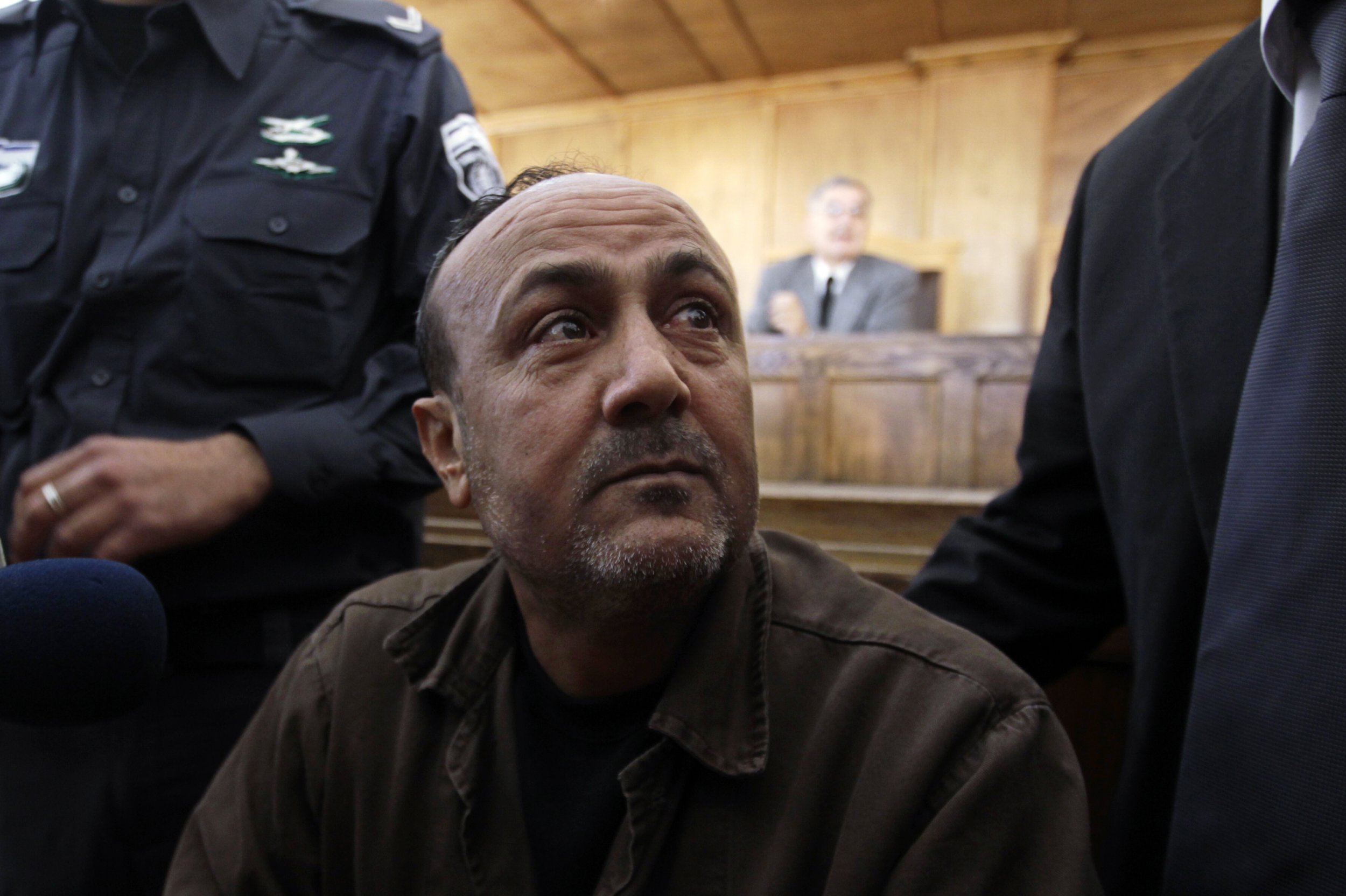
On the surface, the hunger strike led by imprisoned Palestinian leader Marwan Barghouti is about a fairly mundane list of basic demands for prisoners. But it is symbolic of a much wider struggle, one that could constitute a significant turning point in the Israeli-Palestinian conflict and, if mishandled, lead to a third intifada.
There has been much focus on the worthiness of Barghouti's cause and speculation over whether it forms part of an internal leadership struggle within Fatah, the Palestinian movement which effectively governs the West Bank through the Palestinian Authority. But the real issue is whether Israel is prepared to let the hunger strike come to its natural conclusion—that is, to let Barghouti and other Palestinian prisoners die.
The Israeli government and Barghouti are playing a dangerous game of brinkmanship and neither side seems willing to pull back. Israeli ministers, including Defense Minister Avigdor Lieberman and Public Security Minister Gilad Erdan, have extolled the virtues of former British Prime Minister Margaret Thatcher's hardline approach to Provisional IRA hunger strikers in the 1980s, which resulted in the deaths of Bobby Sands and nine others. In the meantime, Barghouti has staked his reputation as a popular national leader on achieving a set of fairly narrow demands, including improved family visitation rights, better healthcare services and installing a public landline to allow prisoners to contact their families.
The Israeli government may think it has a compelling case to let Barghouti die. Israel passed a threshold when it assassinated Hamas leaders Sheikh Yassin (2004) and Abdelaziz Rantisi (2004) in Gaza and risked facing the consequences of doing so; of course, the political context was different. Israel's assassinations of leading Hezbollah figures of Imad Mughnieh (2008), his son Jihad Mughnieh (2015) and Mustafa Badreddine (2016) in Syria continue to show its willingness to make bold moves and endure the outcome.
Since the last intifada in 2000-05, when over 1,000 Israelis and more than 3,000 Palestinians were killed, Gaza has been isolated and contained; the erection of the separation wall has arguably afforded Israel a greater degree of security.
In other words, the isolation of Gaza and cantonization of the West Bank could frustrate Palestinian efforts at coordinating a new intifada. Consequently, the Israeli government — unlike the Israel Defense Forces — may miscalculate that they can ride out the storm of Barghouti's death. And they may feel the benefit of letting the only unifying Palestinian leader committed to the two-state solution leave the scene will ultimately outweigh the cost.
However, the failure to reach a compromise carries grave risks, and the consequences will impact not only the Israelis and Palestinians, but also the international community.
It will disrupt the status quo, which may well have served the interests of the Israeli and Palestinian elite associated with the Palestinian Authority or the past decade, and in turn inspire a disenfranchised generation of Palestinians to take up arms.
The failure will also risk undermining international efforts at strengthening coordination between the Israeli and Palestinian security forces and pit them against each other, as in the last intifada.
Although the wall may prevent a wave of suicide bombers targeting Israel proper, Barghouti's death could trigger a new series of attacks in Jerusalem and against settlements throughout the West Bank.
Barghouti is the only national Palestinian figure that could deliver the two-state solution. His death will not only trigger a punishing and ground-breaking intifada, it will also hammer in the final nail in that coffin.
Simultaneously, Israel's ambition to build an alliance with the so-called 'pragmatic Sunni Arab states' to counter Iranian influence across the region will be severely compromised.
Finally, the advent of a new intifada in the West Bank and Israel's likely hardline response will most likely inspire young men and women in North America and across Europe to support the Palestinian cause.
Enter Donald Trump. This is the perfect moment for the U.S. president to demonstrate his legendary deal making skills and break the deadlock. It might seem a minor matter for the president to take on, but another brutal intifada would smash what remains of the chances for the two-state solution, still US and international policy towards Israel and Palestine. If Trump can help the Israeli government and Barghouti see sense and reach agreement over the list of reasonable prisoner demands, then he may well help avert yet another conflict. And it would earn him international accolades—which surely makes it worth the president's time.
Neil Quilliam is a senior research fellow with the Middle East and North Africa (MENA) Programme at Chatham House and project director of the Syria and Its Neighbours policy
Uncommon Knowledge
Newsweek is committed to challenging conventional wisdom and finding connections in the search for common ground.
Newsweek is committed to challenging conventional wisdom and finding connections in the search for common ground.
About the writer
To read how Newsweek uses AI as a newsroom tool, Click here.





